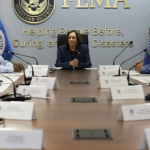In a striking moment at Washington’s National Cathedral on Tuesday, Bishop Mariann Edgar Budde, the first female leader of the Episcopal Diocese of Washington, stood before President Donald Trump and Vice President J.D. Vance. With the weight of the nation’s struggles on her shoulders, she delivered a direct and impassioned plea: “In the name of our God, I ask you to have mercy upon the people in our country who are scared now.”
The service, a long-standing tradition following a presidential inauguration, became an unusual stage for confrontation as Bishop Budde addressed the president seated in the front pew. Her 15-minute sermon, filled with compassion and quiet resolve, was anything but ceremonial. Instead, it was a CALL TO ACTION.

Credit: nbcnews.com
“There are gay, lesbian, and transgender children in Democratic, Republican, and independent families, some who fear for their lives,” Budde declared, her voice steady as she directly referenced marginalized communities now vulnerable in light of Trump’s recent executive actions.
Just one day earlier, Trump had signed a series of controversial orders. Among them, one sought to dismantle birthright citizenship, another aimed at rolling back transgender protections, and others introduced harsher immigration policies. The swift changes sent shockwaves across the country.
Budde did not hold back as she criticized these measures, bringing to light the plight of undocumented immigrants. “The people who pick our crops and clean our office buildings, who labor in poultry farms and meatpacking plants, who wash the dishes after we eat in restaurants and work the night shifts in hospitals; they may not be citizens or have the proper documentation. But the vast majority of immigrants are not criminals. They pay taxes and are good neighbors.”
Her plea for mercy extended to refugees seeking safety and immigrants fearing deportation. “I ask you to have mercy, Mr. President, on those in our communities whose children fear that their parents will be taken away. And that you help those who are fleeing war zones and persecution in their own lands to find compassion and welcome here.”
Mixed Reactions to the Sermon
The person giving this sermon should be added to the deportation list. pic.twitter.com/d7a2z1CM6s
— Rep. Mike Collins (@RepMikeCollins) January 21, 2025
The response to Budde’s bold sermon was swift and divided. Republican Representative Mike Collins of Georgia took to social media, posting a clip of her address with the shocking caption: “The person giving this sermon should be added to the deportation list.”
Others praised Budde for her courage in confronting Trump so directly. In an era where political divides often silence voices in religious spaces, her choice to use the pulpit for advocacy stood out.

Credit: news.sky.com
However, President Trump seemed unimpressed. Upon returning to the White House, he dismissed the service entirely. “I didn’t think it was a good service,” he told reporters. “They can do much better.”
Budde’s History of Confronting Trump
This isn’t the first time Bishop Budde has made headlines for her criticism of the former president. In 2020, she famously denounced Trump for using St. John’s Episcopal Church as a backdrop for a photo op, Bible in hand, after police had cleared racial justice protesters using chemical agents.
“Everything he has said and done is to inflame violence,” Budde told The Washington Post at the time. “We need moral leadership, and he’s done everything to divide us.”
A Message Beyond the Cathedral
Budde’s words, filled with empathy and resolve, are a reminder of the moral responsibility leaders hold. “Our God teaches us that we are to be merciful to the stranger, for we were all once strangers in this land,” she said as her sermon concluded.
For some, her address will be remembered as a moment of clarity and courage in a divided nation. For others, it will serve as a sharp reminder that faith, when wielded with integrity, speaks truth to power.
While Trump might not have taken Budde’s message to heart, her call for mercy resonates far beyond the National Cathedral, echoing through communities that need it most.




















Leave a comment